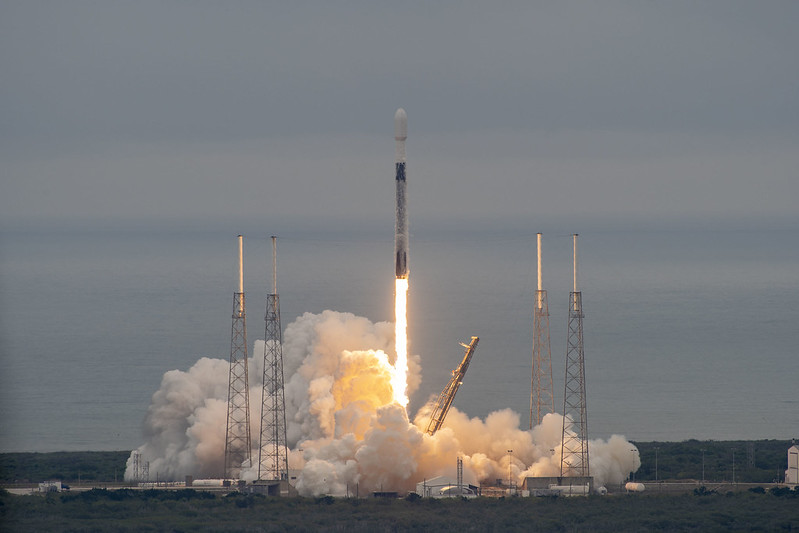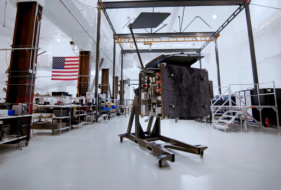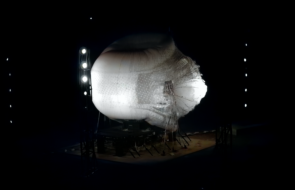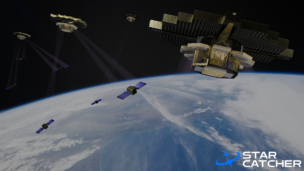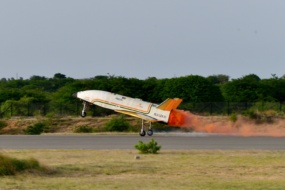If you thought that T-Mobile and SpaceX’s Thursday announcement would scare the H-E-🏒🏒 out of other players working on direct-to-phone connectivity from space, think again.
AST SpaceMobile ($ASTS) execs welcomed the extra attention on their business brought by the T-Mobile/SpaceX technology partnership. So too did Lynk Global, a Virginia startup putting “cell towers in space” that has successfully demonstrated two-way links with thousands of devices.
In a recent interview with Payload, Lynk CEO Charles Miller stressed that SpaceX’s interest in direct-to-phone services validated his startup’s raison d’etre. He also flagged an easter egg from a month ago (see here) that indicated Starlink was preparing to make a mobile play.
Let’s start with your high-level impressions of the SpaceX and T-Mobile event, and what was said on stage.
First off, I predicted this five years ago. I just didn’t know when or how.
When we figured out in 2017 how to connect to the phone with no changes, and realized how big the market opportunity was, it was very clear Elon couldn’t resist, right? That was one of the reasons that for several years, we didn’t talk about anything at all publicly.
But I was actually wrong. I thought he was going to announce a cellular backhaul deal, and react to the Verizon and Amazon deal.
I did too. We’re in the same boat.
In the back of my mind, I gave a small chance—5% to 10%—that he was gonna do this. So, I was wrong.
In hindsight, I could have maybe predicted it because it was T-Mobile, based on my knowledge. This is a key insight and goes to what Elon’s doing. He’s using Sprint PCS spectrum that T-Mobile picked up as part of the acquisition: 1900 megahertz (MHz) or 1.9 gigahertz (GHz) spectrum.
This is a critical insight and so I’ll say the obvious things. First of all, this completely validates our whole business model. Over the last three or four years, every conversation was: “Well can this work? Is this a big business?” Those questions are now totally gone.
In a lot of ways, this really helps Lynk. No one questions that this will be a really big business anymore, and the biggest category of satellite or space service. Bigger than anything else. This is 10X bigger than the traditional Starlink service…it’s the biggest one.
Is that because there’s only a certain amount of fixed wireless spots, or like boats or airliners, that need to be connected, but billions of phones?
There’s a small number, it’s very niche, and user terminals are really expensive. The expense of the user terminal especially limits how many customers adopt it. There’s 3 million existing satellite broadband customers in the world, right? 3 million.
5 billion people have a mobile phone. You charge less per user, but you’re starting with a user base that’s three orders of magnitude bigger. Elon woke up to this; I knew he would. He jumped in, and wonderful, he validated it.
We are the category creator and we’re years ahead of everybody else, including SpaceX. Our job is to stay ahead. Elon said this is hard and it’s only been proven in the lab, but he was wrong. It’s been proven from space. Lynk has already done it.
That’s the obvious part, right? You probably expected me to say that, but it’s true.
If that’s the obvious part, what’s nonobvious?
So, here’s the key things nobody’s pieced together yet. What is Elon’s strategy? We know his strategy with Tesla is to go direct to consumer (DTC). And also what he did at PayPal…he’s an amazing disruptor.
First of all, he’s partnering with Sprint on 1.9 GHz, the old Sprint PCS spectrum. This is great for T-Mobile because it’s their worst spectrum. It’s underutilized and doesn’t penetrate into homes very well. That’s why Sprint got in trouble. They had more dropped calls.
From T-Mobile’s perspective, this is a great set of spectrum to partner with someone like Elon and SpaceX. The second piece that no one’s put together publicly, at least so far, is that about three or four weeks ago, SpaceX filed for Charlie Ergen’s [and Dish’s] EchoStar system.
I saw that. We wrote a small piece about that.
Put the two together: the same antenna that will serve the 1.9 GHz will serve the 2.0 GHz. With that same antenna in space, it makes total technical sense that you do both.
1.9 GHz is not a common spectrum around the world for mobile network operators. Sprint had it. Most phones allow 1.9 GHz around the world, because people come to the US and wanna roam on the Sprint network. It’s a clear minority of other MNOs around the world that use that spectrum for terrestrial wireless.
At the same time, 2.0 GHz is used by no phones around the world. There’s been a process to add it into phones, and 3GPP [a mobile standards body] is recommending adding it into phones. So maybe many phones will have it five to seven years from now.
But they don’t have it now. And it’s already been allocated for mobile satellite spectrum. This plays right to Elon’s strength. He’s a DTC type of guy and will go provide satellite direct-to-phone in every country in the world. That’s his playbook and his strength. Just like Tesla, cutting out the car dealers.
We think that he will do well at that business. As for Lynk’s business, we are completely different from SpaceX. We will never do that. Lynk will never go satellite DTC on a retail basis. We’ll partner with MNOs.
Is it analogous to the difference between Starlink and OneWeb? The former being DTC, the latter being B2B?
Yeah, yeah. What OneWeb would like to do is more wholesale, and Starlink is going retail. That’s another good analogy. Good on you, Ryan. OneWeb is partnering with Airtel and other MNOs, and Starlink is selling DTC wherever they can. That’s his preferred model. And so this will segment the market. We like where we are at, partnering with MNOs.
We had tons of calls on Friday [the day after T-Mobile and SpaceX’s event], with MNOs saying: “please help us.”
It’s not winner-takes-all.
I think those are the key points. No one takes all of the business in the mobile wireless world. This is a huge market with many winners. Lynk will be one and I think SpaceX will be one. We have different strategies.
Where does AST SpaceMobile fit into this equation?
I don’t know if they fit yet.
Okay, fair enough. Did Thursday’s event start new customer conversations, accelerate existing ones, or was it some combination?
It accelerated for the people who had our phone number. It really woke them up that this is urgent and they need to move, and we educated them. We had gotten some pushback: “Oh, this is only messaging.” But SpaceX has the same model as Lynk: start with messaging and go to data.
You plan to switch on commercial service this year. Will that happen with all the MNOs or just a subset?
Oh, we won’t turn everybody on at the same time. That’s just not how it works. It would kill us. There’s not enough. We’ll turn them on one at a time and get them all integrated.
How are you thinking about the order? Is it the order in which you signed contracts?
No. I’m not gonna talk about who we’ll do first. And you’re assuming we figured out exactly who we’re doing first. We’re giving preference to certain operators to go first, who work with us and lean forward. We’ll give them preference, in return for being good partners with us.
My memory is failing me. How are you getting your satellites to space? Are you launching on Falcon 9?
You got it. [Note: Lynk launched Tower 1 on Transporter-4 back in April.]
Is there any sort of concern there about platform risk?
Everybody’s asking me that question, but I have zero data [to indicate that]. The SpaceX rocket team, they are super. I know Gwynne…she’s a straight shooter. I don’t think they would do anything like that, and I think they’re also smart enough to know that would lead to an antitrust suit, if they got caught doing that.
If you remember your history, Boeing did that in the early ’30s. They used their access to airplanes to block the competition, and gave the first 200 airplanes of their next-generation model to United Air Lines, which they owned. That led to an antirust suit that broke Boeing up, for doing that kind of stuff.
So I think SpaceX is smart. First, it’s bad business. Second, they’re gonna make money by launching us as well as their own. And, they would just be creating a big opening for us to be a good customer for somebody else.
As you say, you’ve run up this lead. But SpaceX and Starlink have lots of capital at their disposal. A war chest, so to speak…could that help them close the gap?
That’s only if we don’t raise any capital. There’s plenty of capital out there. It’s our job to share with folks that there will be more than one winner, and this is all validating. We have 14 MNO contracts valued at over $2 billion, so we’re in a great position.
Good to hear that it’s not necessarily being interpreted as a shot across the bow, or a cannibalization of your business.
You know what they say, right? Imitation is the sincerest form of flattery.
